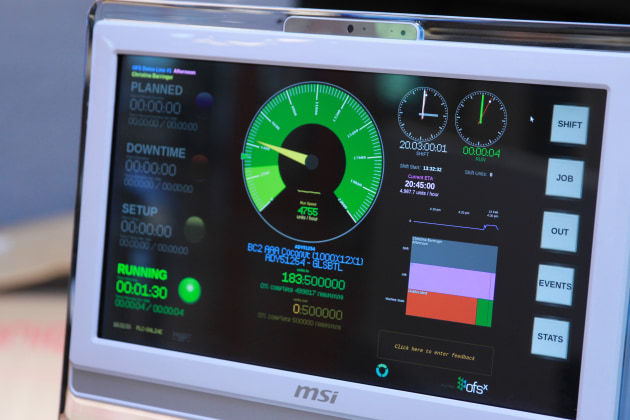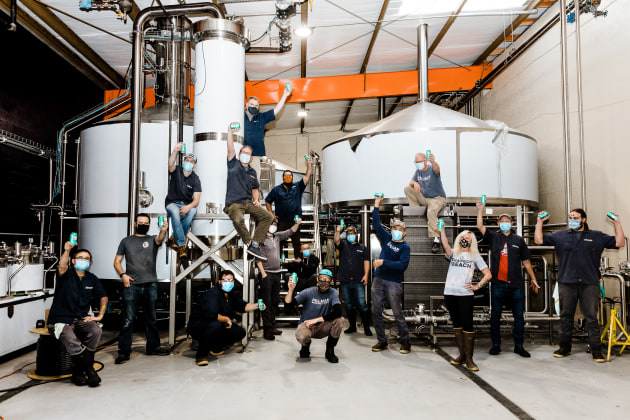Australian manufacturing performance software company OFS has expanded into the US market after signing a deal with Oregon-based craft brewery Pelican Brewing Company to help it take its efficiency to the next level.
OFS is providing a software and hardware solution for Pelican to help provide the brewer with better insights into its operations to help it identify and resolve production issues, improve efficiency, and reduce waste.
The OFS software solution, which was installed in less than a day, uses sensors to draw real-time data from Pelican’s filling and packing lines, and combines this with insights from the people who operate the line to identify and reduce inefficiencies and waste.
“We conducted an industry report focusing on Australian and US brewers and found that craft brewers typically spend more than half their time not making beer,” James Magee, OFS CEO, told PKN.
“That’s not a desired state for any craft brewer, and at the core of it the issue is data – or a lack of how to measure performance and make the right changes based on it. This ultimately leads to bad days on the brewing packing line, and we’re on a campaign to relegate those days to the past.
“Pelican understands this link incredibly well and is making the right data decisions for better days and better beer.”

One of the key areas where Pelican has seen tremendous value is in starting up production, and understanding the inefficiencies and inconsistencies in methods and time consumed as operators perform sanitation and initial quality assurance and control checks, is seen to be of high importance.
With the solution provided, Pelican can now identify the delays that occur early in the morning, allowing the team to optimise these processes in real-time.
Another significant insight, and subsequent opportunity, discovered during the OFS trial at Pelican came from an unlikely source. OFS identified that the cardboard boxes used on the bottling line wasn’t folding correctly due to quality issues, resulting in one of the biggest cases of unplanned downtime.
Pelican was able to use this data to hold the supplier to account by demonstrating with data the amount of lost time that had stemmed from poor quality product.
“One of their major causes of their longer duration downtime had to do with their cartons, made from corrugated boxes, having performance issues with gluing and folding, amongst other things, and in a factory environment, all of that really needs to run seamlessly, otherwise there are constant jam ups,” explained Magee.
“Over our testing period of over several weeks, we were able to come out of that providing a report that articulated exactly how many times this issue had occurred, and for exactly what duration that the issue had occurred.”
OFS also highlighted hundreds of short, approximately one-minute stops at the filler and crowner, which fills and caps beer bottles. As these were minor steps, they had largely gone unnoticed, but the data uncovered by OFS broadcasted the opportunity, the cost, and that the issue or micro-stops needed to be resolved.

“We tend to refer to micro-stops as any unplanned downtime event that has a duration of 90 seconds or less, often on things that aren’t easily identifiable over the course of the operation, but these tend to be almost a ‘death by a thousand cuts’ type of scenario,” Magee continued.
“The micro-stops were killing them, and this is very typical of a beverage filler – whether it’s a craft brewer, a small to medium or large beverage filler – so identifying these issues are the first steps on the path to a resolution.
“Through our experience, we found that the average beverage filler that we monitor loses between four to 10 hours per month to these micro-stops. That averages to around 48 to 120 hours a year of stops at 90 seconds or less, which is just massive.”
Further, OFS identified that one of Pelican’s canning lines had lost almost a day’s worth of production due to running slower than its rated/costed speed.
The team identified several key reasons behind this and performed experiments to improve speed, which during the trial phase alone has led to a speed increase of more than 10 per cent.
“Now that speed increase is quite significant considering the volume they are pumping through in any given week,” added Magee.
“We believe that it is impossible to properly fix an operation’s inefficiencies without the right information being provided in real-time, so the right tools are needed in order to make positive, long-lasting changes to be made.”

With three breweries and brewpubs along the coast near Portland, USA, the brewer currently produces 50,000 barrels every year (equivalent to almost six million litres or 14 million schooners).
Pelican has its sights set on further expansion, buoyed by the renewed energy in the craft beer industry after the slowdown brought on by the Covid pandemic, and the brewer remains committed to its ‘brew-on-demand’ model to maintain its quality, and believes the data OFS unlocks will help it to efficiently expand.
“We had used other software before, but it never had the right levels of automation or any real-time data,” said Martin Bills, director of brewing operations for Pelican Brewing Company.
“My ears are well trained – I can tell if there’s an issue on the line, and in time I can figure out the cause, but OFS gives me and my team that information in real-time so we can resolve it and get back to making beer.
“Over time, the data collected can inform our expansion and ensure we’re maximising our efficiency and reducing waste as we increase output. As a passionate brewer, we simply want to make more exceptional beer for our customers, and OFS shows us the right questions to ask and the answers to do that.”

Pelican is OFS’ first US customer since it launched in the market, with the software the de facto standard in the Australian craft brewing industry with customers including Stomping Ground Brewing Co., Brick Lane Brewing, Tribe Breweries, Moon Dog, and Stone & Wood.
OFS currently has proof-of-concept trials in a number of other breweries in the US.






